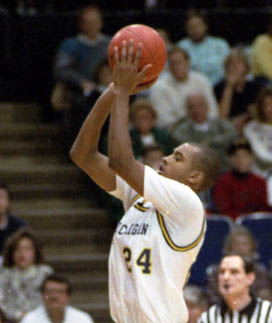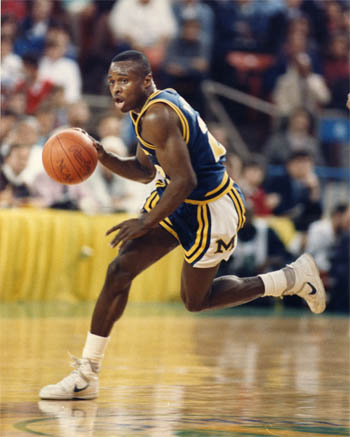
Glen Rice dominated the 1989 NCAA Tournament, scoring 184 points in six games, a record that still stands, and earning Most Outstanding Player honors. (Photo: Bob Kalmbach, U-M Photo Services. Image courtesy Bentley Historical Library.)
Do you remember the 89 team? How far can this year’s team go? Tell us your stories and speak your mind on our letters page
Many believed the Michigan-Illinois winner would get an all-important first-seed in the NCAA tournament the following week. But when their best was called for, the Wolverines played their worst, getting destroyed by Illinois, 89–73—and it wasn’t even that close. “They just blew us out,” recalls Rumeal Robinson, the team’s star point guard. “That last game was a disgrace.”Illinois earned a number one seed, while Michigan slipped to a third seed. But that stunning loss would not be the biggest shock of that year—or even that week.

When coach Bill Frieder (left) announced he would be leaving U-M to coach Arizona State after the tournament, athletic director Bo Schembechler fired him on the spot and replaced him with assistant Steve Fisher. (Photo: Bob Kalmbach, U-M Photo Services. Image courtesy Bentley Historical Library.)
Dorm Room Dreams
The Wolverines’ obstacles were obvious, but some of their strengths were less apparent. During their freshman year, roommates Terry Mills and Rumeal Robinson would talk late into the night. “We were tired. We’d already been through a long day of classes and working out and studying. But every night we’d talk about what we were going to do: graduate on time, with our classmates, and win a national title.”By their junior year, they had made steady progress towards their first dream, and seemed to have a good shot at their second. Three players from the 1989 team would win All-American honors, six were named All-Big Ten, and nine would go on to play professional basketball. The team had real talent. “Most people don’t realize that,” Robinson says. “We had skilled guys at every position. I didn’t have to tell those guys what to do—to get running over there or get open over here. And we’d worked really hard in the off-season to get ready. We were serious.” But the loss to Illinois and Frieder’s firing had shaken the players. Before the team left Ann Arbor for the first round of the NCAA tournament in Atlanta, Sean Higgins was quoted saying he was considering a transfer—the most visible sign of a team in disarray. In a desperate attempt to motivate his demoralized team, Fisher asked Schembechler to address the squad. Schembechler asked Fisher, “Are you sure you want me to talk to your team? Because you might be without one or two players when I’m done.””It’s okay,” Fisher said. “Do it.” Bo met the players at Crisler. “We’ve got Rumeal Robinson, the best point guard in the country,” he told them. “We’ve got Glen Rice, the sharpest shooter in the land. And we’ve got Loy Vaught, Terry Mills and Mark Hughes up front. Men, I’m telling you: There’s absolutely no reason we can’t win this regional.

Bo Schembechler’s pre-tourney speech galvanized Sean Higgins. (Photo: Bob Kalmbach, U-M Photo Services. Image courtesy Bentley Historical Library.)
A madder March than most
Most tournament teams feel more tension with each round—but for this team, it was the opposite. For 12 straight years, Michigan had suffered early-round departures. Throw in all the drama surrounding the team the first week, and the Wolverines’ could not have been more wired for the opening tip against 14th-seeded Xavier. “People don’t really understand how nerve-wracking that first game was,” Robinson says. “We’d just gotten blown out by Illinois, we’d just lost our coach, and we knew all about the great Michigan teams that got knocked out of the NCAAs so early. That was pressure.”The Wolverines didn’t overcome their jitters until there was just 3:30 left, when Glen Rice’s three-pointer pulled the team ahead, 84-82. Michigan had earned their first victory—and a great sense of relief. Michigan followed the same script to come from behind against South Alabama and North Carolina before white-washing a good Virginia team, 102-65. In two short weeks, the Wolverines had captured a spot in the Final Four, and the nation’s imagination. The unlikely rise of this headless horseman dominated the headlines of every sports publication in the country. Even the players’ parents were becoming celebrities.In the national semi-finals, Michigan faced its nemesis, the Fighting Illini. But this time, after 33 lead changes, Sean Higgins performed a perfect put-back in the final seconds to seal an 83-81 victory. “Our first menace was UNC, and our second was Illinois,” Robinson recalls. “Once we beat them both, all the pressure in the world fell off us. We only felt relaxed in the final game, not the first one.”
Pressure player
Robinson drew on that calm confidence when the final game against Seton Hall went into overtime. Down 79-76, with less than a minute remaining, Robinson’s old roommate Terry Mills hit a turn-around jump shot to cut Seton Hall’s lead to one. On the next possession, with time running out, Robinson daringly drove the lane, and drew the foul. When Robinson stepped up to the foul line, behind 79-78 with three seconds left, the game was in his hands. If Robinson missed the first shot, Michigan would lose. If he made them both, the Wolverines would win their first national basketball title. In the long and rich history of the NCAA tournament, no one had ever been in this situation before. At this singular moment, Robinson’s teammates decided to leave him alone–they didn’t slap his hand or even talk to him—in the same way baseball players isolate a pitcher working on a no-hitter.

Rumeal Robinson scored two of the toughest, most enthralling points in hoops history when, with three seconds remaining in the final game, he hit both his free throws. (Photo: Bob Kalmbach. Image courtesy Bentley Historical Library.)


